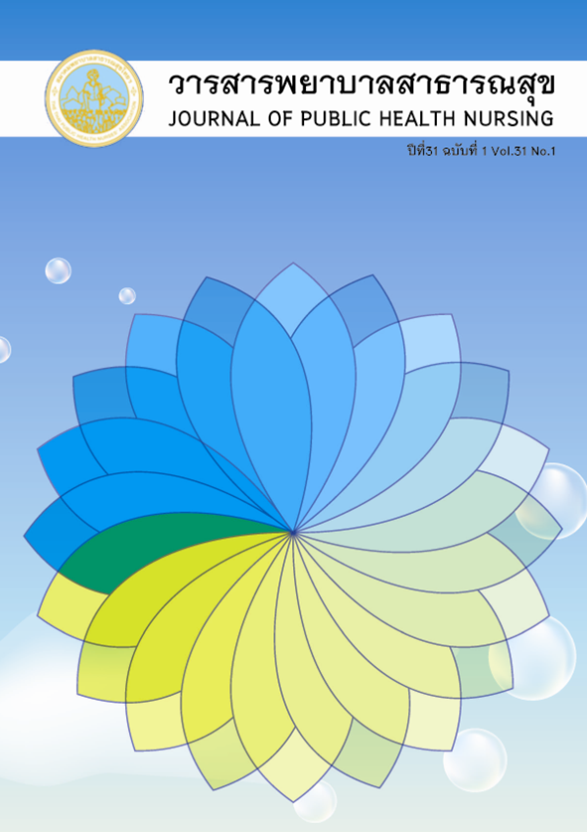ผลของโปรแกรมส่งเสริมสุขภาพผู้สูงอายุกลุ่มเสี่ยงต่อภาวะสมองเสื่อมในชุมชนโดยการมีส่วนร่วมของครอบครัว
Keywords:
ภาวะสมองเสื่อมในผู้สูงอายุ, การส่งเสริมสุขภาพผู้สูงอายุ, ทฤษฎีความเชื่อด้านสุขภาพ, แนวคิดแรงสนับสนุนทางสังคม, ELDERLY WITH ALZHAIMER, HEALTH BELIEF MODEL, SOCIAL SUPPORT, HEALTHPROMOTION PROGRAMS FOR THE ELDERLYAbstract
การวิจัยกึ่งทดลองมีวัตถุประสงค์เพื่อศึกษาผลของโปรแกรมส่งเสริมสุขภาพผู้สูงอายุกลุ่มเสี่ยงต่อภาวะสมองเสื่อมในชุมชนโดยการมีส่วนร่วมของครอบครัวกลุ่มตัวอย่างในการศึกษาครั้งคือกลุ่มผู้สูงอายุที่มีอายุ 60-75ปี จำนวน 64 คน แบ่งเป็นกลุ่มทดลองและกลุ่มเปรียบเทียบ กลุ่มละ 32 คน โดยมีระยะเวลาในการศึกษา6 สัปดาห์ แบ่งเป็นระยะทดลอง 4 และระยะติดตามผล 2 สัปดาห์ โดยประยุกต์ทฤษฎีความเชื่อด้านสุขภาพ(Health belief Model )และแนวคิดแรงสนับสนุนทางสังคม เก็บรวบรวมข้อมูลด้วยแบบสอบถาม ในระยะก่อนการทดลอง หลังการทดลองและระยะติดตามผล วิเคราะห์ข้อมูลด้วยสถิติค่าเฉลี่ย ร้อยละ ส่วนเบี่ยงเบนมาตรฐานChi-square,Repeated Measure ANOVA, BonferroniและIndependent t-test
ผลการวิจัยพบว่ากลุ่มทดลองมีค่าคะแนนเฉลี่ยด้านความรู้ การรับรู้ความรุนแรงและโอกาสเสี่ยงต่อการเกิดภาวะสมองเสื่อมการรับรู้ประโยชน์และอุปสรรคต่อการดูแลสุขภาพตนเองและการปฏิบัติดูแลสุขภาพตนเองดีขึ้นกว่าก่อนการทดลองและดีกว่ากลุ่มเปรียบเทียบ อย่างมีนัยสำคัญทางสถิติ(P-value <0.05)
การวิจัยครั้งนี้สรุปได้ว่าโปรแกรมส่งเสริมสุขภาพผู้สูงอายุกลุ่มเสี่ยงต่อภาวะสมองเสื่อมในชุมชนโดยการมีส่วนร่วมของครอบครัว ทำให้เกิดการเปลี่ยนแปลงเกี่ยวกับการปฏิบัติตัวเพื่อป้องกันการเกิดภาวะสมองเสื่อมดีขึ้น ซึ่งสามารถนำไปประยุกต์ใช้กับประชากรกลุ่มโรคที่มีลักษณะใกล้เคียงกันได้
THE HEALTH PROMOTION PROGRAM FOR THE ELDERLY AT RISK GROUP OF ALZHEIMER’S IN COMMUNITY
The purpose of this is Quasi-experiment study was for the health promotion program for the elderly risk at risk of Alzheimer’s in the community. The samples were of the elderly between 60-75 years old; The 64 participants were divided into two groups, an experimental group and a comparison group which consisted of 32 people in each group. The research was conducted for a period of 6 weeks. 4weeks was allotted for the intervention and another 2 weeks provided for the follow up. The data collection was conducted by questionnaires for the pre-test, post-test and follow-up periods. The Statistical analysis was performed by using percentage, mean, standard deviation, Chi-square, Repeated measure ANOVA, Bonferroni method and Independent t-test.
Results revealed the experimental group had a significantly higher mean score of knowledge of Alzheimer’s, perceived severity, perceived susceptibility to Alzheimer’s, perceived benefits and barriers
to health care and practice self care of the elderly, Alzheimer’s prevention behaviors then the pre-test stage and those in the comparison group (p-value < 0.05)
This research’s result, for the health promotion program for the elderly at risk of Alzheimer’s in the community, shows the beneficial in positive changes for the experimental group’s behavior in preventing Alzheimer’s disease, which can be applied to other similar groups of chronic disease populations.
Downloads
How to Cite
Issue
Section
License
บทความที่ตีพิมพ์และแผนภูมิรูปภาพถือเป็นลิขสิทธิ์ของวารสารพยาบาลสาธารณสุข (Thai Public Health Nurses Association)







